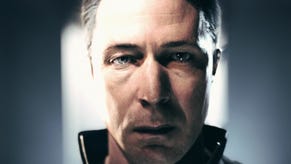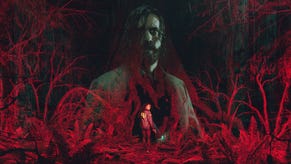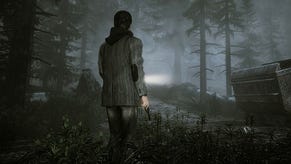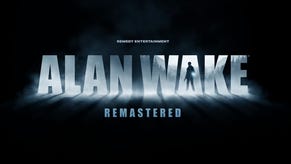Alan Wake
You can call him Al.
Apologies to any Alans reading Eurogamer today, but it's always been one of those names that conjures up visions of the ultimate grey civil servant. Like Norman. Or Kenneth. Or any number of folks in the Conservative Party, not-at-all-coincidentally. As far as game character names go, it joins the pantheon of boringly named game heroes, like Gordon Freeman, Monty Mole and um, Eric from Skooldaze. But as someone pointed as we weaved through the streets of Barcelona, would Half-Life have hit quite as big if Valve's seminal opus was called Gordon Freeman?
Maybe in Remedy's homeland of Finland, Alan sounds like an Everyman. Frankly, with a game as intriguing and spectacular as this, they could have a worldwide hit with Cuthbert Jones.
Shown off behind closed doors at last week's X06 by Remedy's lead writer Sam Lake, the 20 minute presentation gave us a glimpse at what could easily turn out to be the game of 2007. Following on from the impressive taster we were given at E3 2005, the Remedy chaps once again reminded us that Alan Wake is a psychological action thriller set in a sleepy Pacific North-western town. Heavily inspired by Stephen King and Twin Peaks, the plan is to craft a movie-like atmosphere, but structure the game like a television series, complete with episodic progress and cliffhangers.
Something wicked this way comes
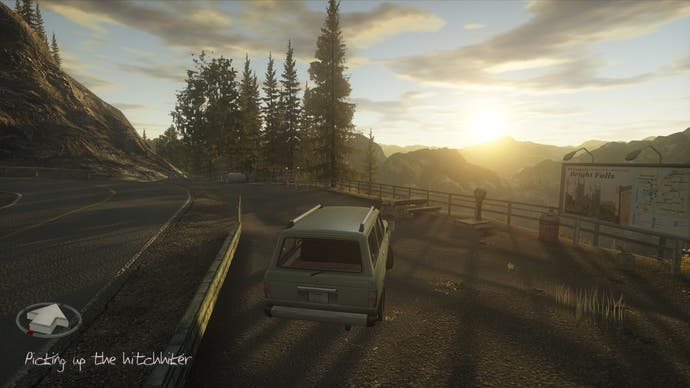
Alan Wake is a troubled author who has relocated to the seemingly idyllic town of Bright Falls following the disappearance of his girlfriend in circumstances that mirror his own best-selling fiction. Suffering from a combination of terrible nightmares, insomnia and writer's block, he hopes to find solace and a cure for his affliction in more peaceful surroundings so he can get his life back on track.
But strange things continue to happen to Alan. He finds more written passages appearing in his own handwriting that he has no memory of - and then finds out that these events also play out in real-life, and this is where you come in.
Picking up the thread at the very start of the game, Remedy wastes no time is demonstrating its incredible environmental technology. Capable of rendering vastly detailed cinematic landscapes with no pop-up or slowdown, it's clear that the undulating, forested terrain of Bright Falls is easily the most ambitious looking openworld environment seen in a videogame. Panning around this breathtaking scenery, we're told it measures an incredible 10x10km - and then promptly zoomed in at superspeed to a view of Alan stood on the side of a hill. Good start.
Switching to a more traditional third-person perspective, we're shown Alan running around on the way to starting the opening mission, with the screen furniture largely absent save for a hand-written mission prompt. Coat flapping in true Remedy style (they were big fans of this in Max Payne, you may recall), a gas station attendant tells you to go to a nearby mountainside cabin. With his inner monologue forming part of the game's narrative device, you get the sense that Alan is cheerily ignorant of the wider significance of his problems - just the desire to get to the bottom of them.
Never pick up a hitcher
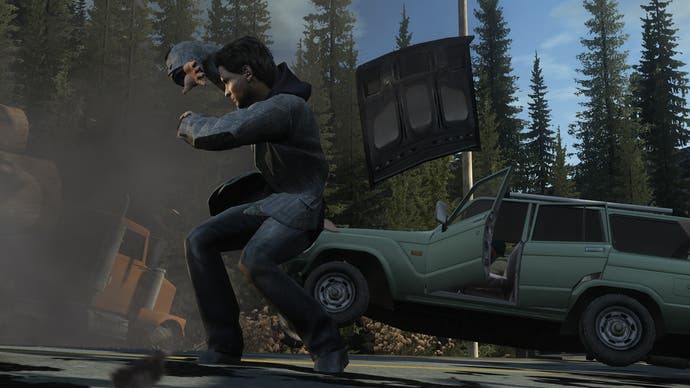
We then see a short sequence where Alan gets into a car and drives along a winding road, with thoughts of his latest writing that predicts a hitchhiker will appear. Sure enough, Alan picks up the hitcher and mentions how strange it is that his 'book' told him about picking someone up - to which the hitcher makes the not unreasonable assumption that he's supposed to be the killer. On the contrary, the hitcher gets killed, Alan informs him. Run Alan! Run the hell away!
And then, around the next bend we see what appears to be a hit and run accident. The guy lying prostrate on the tarmac looks dead, but Alan goes to investigate. Meanwhile, the hitcher does, indeed, get killed by a passing lorry that ploughs into Alan's car at high speed. Stranger still, there's no sign of the body when Alan goes to investigate, noting that the hitcher's later significance in his writing, where he's supposedly going to stalk him in some way. Blacking out, he comes around just as it's getting dark. Uh-oh.
Somewhat stranded in the middle of nowhere, Alan's left with no choice but to head off on foot for the nearby cabin up on a hillside half a kilometre or so away. As he approaches over a wobbly rope bridge, the scene's illuminated only by the streetlights on either side, lending it a foreboding air. But in extremely spooky fashion, every time he runs towards one of them, it explodes in a crackle of electricity and broken glass. And just as Alan gets towards the cabin, torch in hand, some kind of spectral apparition starts approaching him from behind. And just before we can get a handle on what it is, or how he deals with it using light as a weapon, the scene fades out and we're shown no more of the game... for now. All Remedy would let on is that enemies draw strength from the shadows, and light is your greatest ally - ensuring that you must skilfully combine your use of light with more conventional weapons. Gaffa tape plus torch plus machine gun = winner.
Plan B
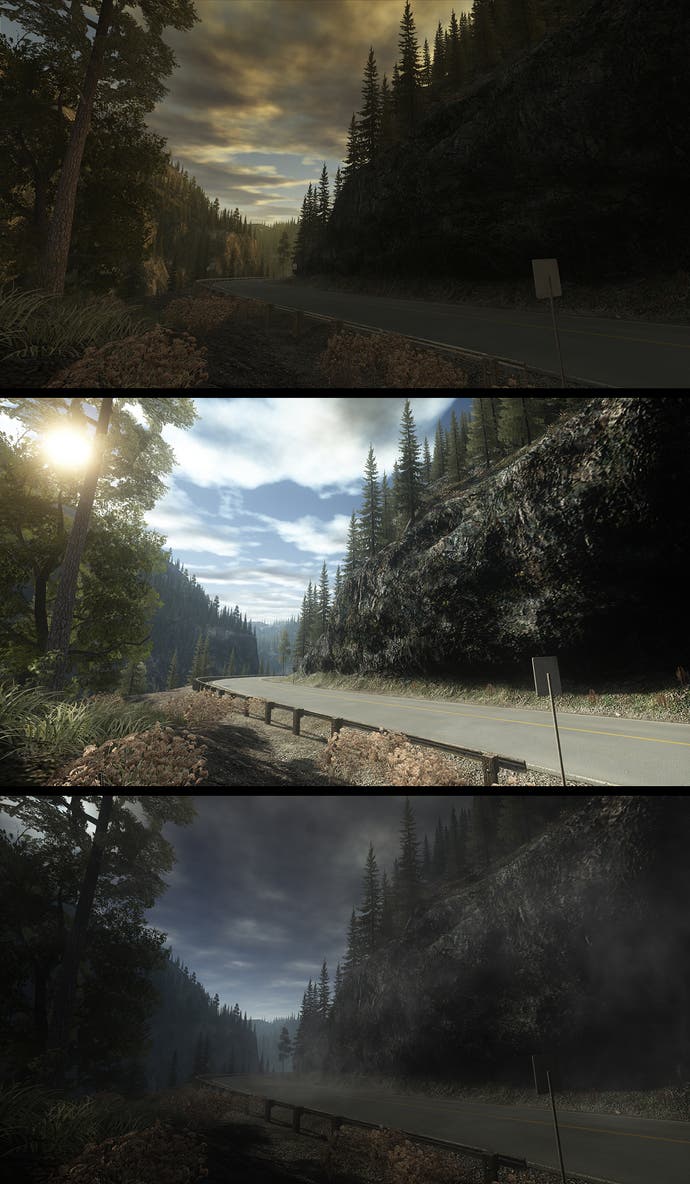
Even with the game unlikely to emerge from the, ahem, shadows for some time yet, it looks truly jaw-droppingly stunning in way that only BioShock can rival at the moment. It impresses not just in terms of the obvious visual appeal, but the immensely oppressive atmosphere with which Remedy manages to enrich every scene. With perhaps a little more work on the voice-overs, there's every reason to think that Remedy could succeed in its ambitions to create a true movie-like atmosphere. Hopefully not of the B variety.
Elsewhere in the presentation, we're also shown off the some rather impressive weather dynamics and what sort of effect they might have on the gameplay. Firing a twister into action, we're shown how every object in the game has a definite physical property - from the smallest box to entire buildings and cars. Carving the ferocious twister through the terrain, buildings aren't just destroyed, but literally sucked up in the swirl piece by piece, tile by tile, causing enormous artefacts and tiny debris caught up in the chaos to come crashing down to Earth once released from its grip. Even more impressive was how explosive objects reacted to the violent winds, often blowing themselves apart inside the twister - all dynamically, all real-time. Even large, weighty objects like cars got caught up in the mayhem, twisting frantically alongside assorted debris before unexpectedly crashing to earth mere feet away from where Alan was running to.
And on top of that, we were shown the full day-night light cycle, and how the whole mood of the game could change on the fly by alerting a few basic parameters. With wind applied, we could even see the branches of trees swaying in response. It was effortlessly brilliant, a truly next generation project in action before our eyes.
Although it's evident that the world of Alan Wake is going to be linear and structured like an episodic TV show (but released as one whole game, to be clear), the openworld environment will give players the chance to uncover the mysteries of Bright Falls, where they will "pay close attention", explore and do "other things" that Remedy wasn't ready to elaborate on at this stage. Ultimately, to drive the story forward, you'll still have to approach the missions eventually like you do with any other openworld game, but it's heartening that Remedy is giving players more freedom than it did with the two Max Payne titles. Let's just hope that freedom doesn't blur the focus.
As technologically astounding as Alan Wake looks at this point in time, and as impressive as Remedy's goals are, quite how the game plays is another matter. It's perhaps interesting that at the very moment that film makers like Peter Jackson have eyed the interactive medium of videogames as an opportunity to strike out and do something different with storytelling, Remedy is actually doing that right now with Alan Wake. On paper, the ingredients sound irresistible - mixing Stephen King inspired narrative with a Twin Peaks-style environment and adding a dash of unhinged Silent Hill mystery is practically our dream game. Let's hope this one comes off.
Alan Wake is coming to Xbox 360 and PC sometime in 2007, and will be published by Microsoft.



